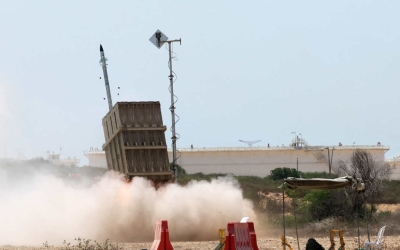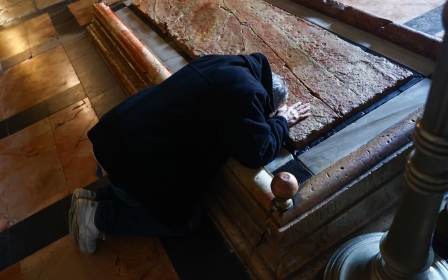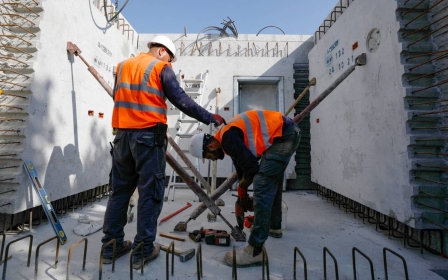Israeli press review: Jewish worshippers spit on Christians in Jerusalem

‘Widespread’ harassment of Christians
Several incidents of Jewish Israelis spitting on or near Christian worshippers in occupied East Jerusalem have been recorded this week, signalling an increase in such attacks.
One of the incidents showed a group of Jewish worshippers walking through a narrow alleyway by the Lions' Gate in Jerusalem's Old City and coming across a group of Christians worshippers carrying a cross.
Several of the Jewish worshippers, who were marking the Sukkot holiday, then began spitting mostly on the ground near members of the Christian procession, which was headed in the opposite direction.
Such incidents gave evidence that these attacks have become widespread, Haaretz said.
New MEE newsletter: Jerusalem Dispatch
Sign up to get the latest insights and analysis on Israel-Palestine, alongside Turkey Unpacked and other MEE newsletters
According to the news daily, the Global Religious Freedom Action Center recorded 21 such attacks targeting Christians or Christian institutions in August.
קבוצה של צליינים יוצאת עם הצלב לרחוב שער האריות ונתקלת בקבוצה של מתפללים יהודים עם 4 המינים ואז מתחילות היריקות. ספרתי לפחות 7 בכמה שניות. pic.twitter.com/YjqaknATLw
— نير حسون Nir Hasson ניר חסון (@nirhasson) October 2, 2023
Anti-Christian hate crimes have spiked in Israel since the new government - described as the most right-wing in the country's history - took office late last year.
Most of the attacks are committed by young ultranationalist men or settlers, including some soldiers in the Israeli army.
These include trespassing on churches, spitting on churchgoers, destruction of Christian symbols and vandalising Christian graves, among other acts.
Police mark Eritreans with numbers
Israeli police marked Eritrean asylum seekers with numbered stickers after detaining them on the weekend, Haaretz reported on Monday.
Officers tied the detainees' hands with zip ties instead of police handcuffs and forced them to sit on the ground, according to their attorney.
A police source told Haaretz the asylum seekers, who did not have IDs, refused to identify themselves. The source added that stickers were placed on them briefly to link them with fingerprints before they were removed.
The group were arrested in Tel Aviv in connection with violent incidents that took place between Eritreans in Israel in the last month. They were released on Sunday.
On 2 September, a group of Eritreans opposing their government marched in Tel Aviv against an event organised by their country’s embassy in Israel.
As protesters pushed on, police used live rounds, tear gas and stun grenades to disperse the crowds, wounding 170 people.
Since then, tensions have remained high between opponents and supporters of the Eritrean government among asylum seekers from the east African country in Israel.
Record high arms exports
Exports of Israel’s defence industries have reached record high levels in the last two years, newly revealed data has shown.
According to figures provided by the defence ministry, Israel sold arms worth $11.4bn in 2021, a jump from $8.6bn a year earlier. In 2022, deals were worth $12.5bn.
The spike in sales was attributed in part to arms deals agreed with signatories of the so-called Abraham Accords, which include the United Arab Emirates (UAE), Bahrain, Morocco and Sudan.
Another reason is the increased demand from Europe and Nato countries in the aftermath of the Russian invasion of Ukraine.
The data was disclosed in response to a freedom of information request made by human rights lawyer Eitay Mack.
They also showed that the number of countries approved to receive arms and security-related cyber systems has skyrocketed.
In 2022, 56 countries were given approvals to receive drones, compared to 40 in 2020, marking a 40 percent increase.
In the same period, the number of countries approved to receive munitions grew by 45 percent, jumping from 42 to 61.
Sales of training programmes jumped from two countries in 2020 to 17 in 2022, while cyber and intelligence system sales grew from 67 to 83 countries in the two-year period.
Israel seeks Gaza calm for Saudi deal’s sake
The Israeli government is considering various steps to maintain calm with Gaza amid talks with Saudi Arabia over a deal to establish formal ties.
According to Haaretz, those steps include increasing the number of Gaza-based Palestinian labourers who can work in Israel from 15,000 to 20,000.
Another measure is reportedly easing the export of goods from Gaza to the West Bank.
The Israeli government is also in talks with Qatar to resume its finance aid package to the Hamas-run government in the besieged enclave.
The move comes after days of Palestinian protests at the fence separating the Gaza Strip from Israel against the closure of the Erez Crossing, the only gateway for pedestrians entering Israel from the coastal enclave.
The Monday report said Israeli officials fear a conflict with armed groups in Gaza could undermine the US-mediated talks between Israel and Saudi Arabia.
Preserving calm would make it easier for Riyadh to move ahead with a deal, it added.
*Israeli press review is a digest of news reports not independently verified as accurate by Middle East Eye.
Middle East Eye delivers independent and unrivalled coverage and analysis of the Middle East, North Africa and beyond. To learn more about republishing this content and the associated fees, please fill out this form. More about MEE can be found here.





